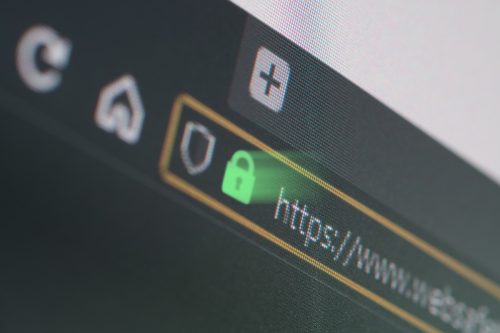4 Times You Shouldn't Enter Your Credit Card Information Online, Experts Say
These red flags mean you're better off shopping elsewhere.
You may not think twice about entering your credit card information online, but did you know that as of 2023, a whopping 65 percent of people with credit and debit cards have been victims of fraud at some point in their lives? That's an increase from 58 percent last year, meaning credit card scams are on the rise. And while online shopping sure is convenient, it also poses a major risk for these crimes. After all, hackers and thieves can commit fraud without physical access to your cards.
"Cybercriminals can use a variety of tactics to obtain your credit card information, such as phishing scams, malware, and hacking into unsecured websites," says Levon L. Galstyan, a certified public accountant at Oak View Law Group. "Once they have your credit card information, they can use it to make unauthorized purchases or even steal your identity.
"The consequences of credit card fraud can be severe, including financial losses, damaged credit scores, and even legal issues," Galstyan adds. "It can be a long and complicated process to recover your money and clear your credit report, which is why prevention is crucial."
While you can't necessarily stop your favorite retailers from experiencing unexpected data breaches, keeping an eye out for certain red flags can help to protect your information. Keep reading to hear from financial experts about the main times you shouldn't enter your credit card information online.
READ THIS NEXT: Never Use Autopay for These 6 Bills, According to Financial Experts.
4 Times You Shouldn't Enter Your Credit Card Information Online
1. When you're using unencrypted public WiFi.

Next time you're tempted to buy something while hanging out at Starbucks, the airport, or your local library, consider waiting until you get home.
Sejal-Lakhani Bhatt, cybersecurity expert and CEO of TechWerxe, says making online purchases while using unsecured public WiFi can make you vulnerable to hackers. This is because they can exploit insecurities in these networks, and then steal your credit card number, along with other sensitive information, like account passwords.
2. If the website doesn't have an SSL certificate.

According to Julien Brault, CEO of Hardbacon, you should always check to see if a retailer's web address starts with HTTPS. That extra "S" indicates that the store has an SSL certificate to protect customers' information. Basically, even if a hacker gains access to the data exchanged, they won't be able to use it to steal your identity or commit fraud since all the information is encrypted.
Another easy way to check if the website has an SSL certificate is to simply look for a green lock symbol on the left of the URL address bar.
When a site only shows HTTP at the beginning of the URL, and there's no green lock icon to be found, that means the connection between your browser and the server is not encrypted, according to Galstyan. This leaves your credit card info vulnerable to interception.
For more financial advice delivered straight to your inbox, sign up for our daily newsletter.
3. If you receive suspicious emails.

"Do not enter your credit card information on any website that you have been directed to through a suspicious email," Galstyan tells Best Life.
"Phishing" is a common method that scammers and hackers use to trick people into providing their credit card information. They'll send you a message pretending to be from a reputable company, and try to incite you to click a particular link within the body of the email. For example, a phishing email might:
- Insist you owe a balance on a bill and urge you to make a payment
- Claim there's been suspicious activity in your account
- Offer you a special deal, or say you're eligible for a refund
When you receive an email asking you to click a link, make sure you recognize the sender. Even if the message appears to be from a company you have an account with, it's always best to contact them directly rather than click the link.
READ THIS NEXT: Never Use Your Credit Card for These 6 Purchases, According to Financial Experts.
4. If the website just looks sketchy.

It's important to always trust your gut when online shopping.
"Scammers sometimes spoof or clone a legitimate site to trick unsuspecting users into providing personal information," explains Enoch Omolulu, a personal finance expert at Savvy New Canadians. "If a website looks clunky and unprofessional, pause and double-check it's legit before providing sensitive information."
Even a quick Google search can help you vet any retailer with a suspicious-looking website. And if you find negative reviews for that retailer on a site like Trustpilot—or can't find much information about them—then it's best to avoid doing business with them.
"Only enter your credit card information on websites that have a solid reputation," adds Galstyan.
Best Life offers the most up-to-date financial information from top experts and the latest news and research, but our content is not meant to be a substitute for professional guidance. When it comes to the money you're spending, saving, or investing, always consult your financial advisor directly.
Editor's note: A previous version of this story misattributed quotes made by Julien Brault. The story has been updated to reflect this.






















